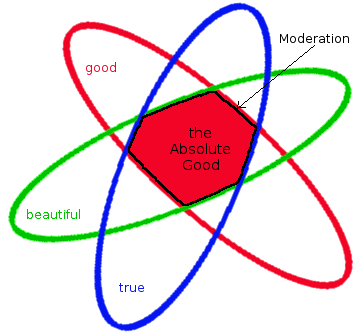The Good, the True, the Beautiful...and Justice
From the mythical to the philosophical...

Zeus is supposed to be in charge. He boasts of being stronger than all the
other gods together but
appears to avoid putting it to the test. See "the golden rope", Il. 8.19. Hera
is number two with a bullet,
Athena is Tritogeneia, third-born
(Zeus' favourite daughter) and
Aphrodite is fourth, though sometimes stronger than Zeus himself.

The solid red part is our Nomos, its border is Sophrosyne
cleverness (μῆτις), know-how,
know-when (boldness)
"have" beauty or "be" beauty
excellence (ἀρετή),
"unchanging"-ness
ἀνδρεία
courage, manliness
Χρυσόθεμις
"golden custom"
Λαοδίκη
"people (or army)'s justice"
Ἰφιάνασσα
"she rules by force"
God the Father -
the Good is first
the Holy Spirit -
we see that it's True
the Son -
the hero who dies for us like Achilles
With the Good, True and Beautiful is meant: the desire for those concepts. Justice is a rule, a
duty that we have. Plato (or Socrates, in the Symposium) has some trouble dealing with the desire for the beautiful by itself
so he redefines that as the desire for the Good and later additionally for the True. So Eros becomes a desire for all three. So its virtue becomes
Sophrosyne, Moderation, the one that bounds the union of the three. There he finds the real beauty.

